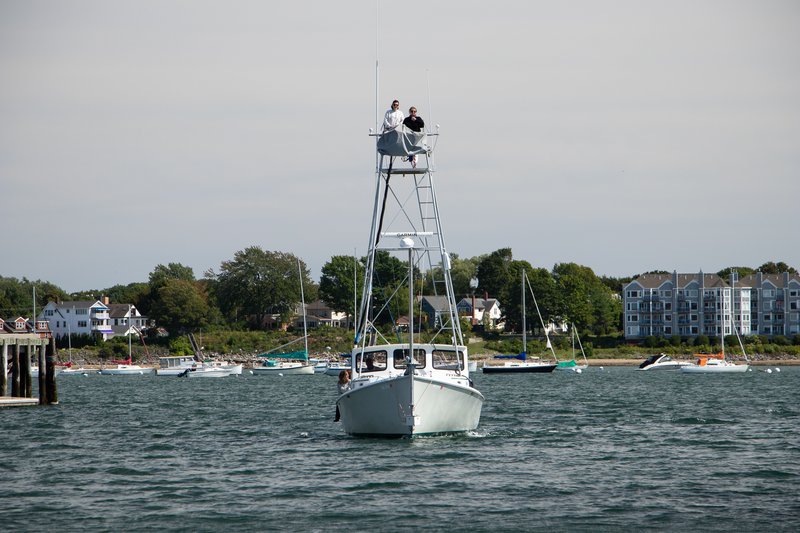The Merlin: Updates to our New Research Vessel
Announcements | Nov 14, 2020
We've equipped our new research vessel, the Merlin, with critical structural, safety, and navigational upgrades. What began as a harpoon tuna fishing vessel, generously donated to GMRI by David Linney and the Linney family, is now a state of the art research and education vessel. We are excited to chart a new course with the Merlin to deepen our knowledge of the Gulf of Maine ecosystem and to help people see, understand, and appreciate all its natural wonders.

Our Thanks
Any story about the Merlin has to begin with David Linney and his family, who generously donated the former fishing vessel to us after David Linney's passing. Last September, GMRI staff joined David's family to reflect on his legacy, and celebrate the impacts still to come from the newly retrofitted Merlin that now calls the harbor behind GMRI home. We are excited to share the new capabilities of this updated vessel, and the potential for strengthening the ways in which we can conduct marine research and educate the public.
Preparing the Merlin for Action
GMRI scientists Zachary Whitener, Aaron Whitman, Walt Golet, and Graham Sherwood took charge of upgrading the Merlin to prepare her for a variety of field purposes. They removed certain custom upgrades, such as David's fish box and chiller system, and re-glassed the deck to provide more space for research and educational activities. The team of researchers also installed a complete state-of-the-art Garmin electronics and navigation package (also generously donated) to improve the boat’s navigational capabilities, as well as new pumps to process samples at sea and keep the boat clean after the Merlin's adventures.
When it comes to conducting research at sea, safety is the top priority. So, the team also purchased critical safety equipment such as offshore flares, an automated external defibrillator (AED), and a full first-aid kit for the vessel. These additions not only fulfill essential safety requirements, but also allow researchers to safely travel up to 100 miles offshore and be better prepared in the event of emergencies in remote locations.



Research Opportunities
After installing those preliminary improvements to the vessel, GMRI staff began adding equipment and accessories that advance our research program capabilities. For example, Dr. Sherwood installed mounts and adapters that fit sampling instruments on deck, which then deploy into the water and collect eDNA samples. Those tools, combined with the new capacity to travel further offshore, support Dr. Sherwood’s research on assessing environmental DNA (eDNA) as a novel approach for large-scale ecosystem and fisheries monitoring. As fish move through the water, they shed skin and other cells containing their DNA. His work will help establish how scientists can analyze these DNA trails to estimate the overall health of commercially and ecologically important fish stocks.
Dr. Sherwood and his team took the Merlin out to sea to conduct its first eDNA field research expedition in early September. Thanks to the new and improved research vessel, he and his team were able to investigate Atlantic herring population abundance and distribution in regions where federal surveying is not possible in an effort to fill a critical gap in our understanding of inshore herring life history.

Educational Opportunities
The Merlin will also play a key role in making more GMRI educational opportunities available to aspiring young scientists. Each summer, several undergraduate students participating in our Research Experience for Undergraduates (REU) program are exposed to the process of designing, conducting, and presenting independent marine research projects over the course of ten weeks. A major component of their summer experience will include trips on the Merlin to learn key field research methods and to conduct their own research.
We will also work closely with the University of Maine to coordinate trips on the Merlin for undergraduate and graduate courses, including a new summer course developed by Dr. Golet on Applied Fisheries Techniques. This course will train students and give them the hands-on experience they need to enter the fisheries industry in state, federal, academic, or nonprofit laboratories.
Steering for the Horizon
The Gulf of Maine is home to exceptionally beautiful and mysterious ocean ecosystems. Thanks to the generosity of donors like the Linney family, the Merlin will help us explore its waters, learn about its inhabitants, and understand how to best protect its precious resources. Continued maintenance and support for the Merlin will enable us to conduct critical ocean research and educate students for years to come.





